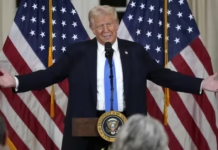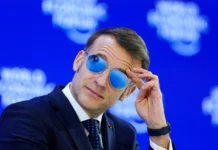As the war in Ukraine grinds into its third year, the decisive battlefield may no longer lie in the trenches of eastern Ukraine or beneath the skies over Kyiv and Dnipro, where Russian drone strikes have surged in recent days. Instead, a more strategic and potentially game-changing front has emerged, the battle for the influence of U.S. President Donald Trump.
Both Moscow and Kyiv are now intensely focused on winning over the former president, whose unpredictable stance on the war has made him a critical player in shaping the conflict’s future trajectory. Trump, increasingly frustrated with stalled peace efforts, is expected to hold a phone call with Russian President Vladimir Putin later today, a conversation that may prove pivotal.
Sources close to the matter say that European officials are scrambling to reach Trump before the call, concerned that his stance may be swayed by whomever he speaks to last. These concerns are rooted in recent events: just last month, after an encounter with Ukrainian President Volodymyr Zelensky at Pope Francis’ funeral, Trump issued some of his harshest criticisms of Putin yet, condemning a Russian missile strike on Kyiv and questioning the Kremlin’s sincerity about ending the war.
Now, with a ceasefire proposal backed by Trump but rejected by Russia, and conditionally accepted by Ukraine, the upcoming call gives Putin exclusive access to Trump’s ear, and potentially a chance to steer the former president’s views in Russia’s favor. Analysts believe Putin will likely use the conversation to charm, bargain, and possibly manipulate Trump, aiming to cast Ukraine as the main obstacle to peace.
The Kremlin and Kyiv are locked in a fierce narrative war, each striving to convince Trump that the other side is blocking peace. Their goal: to influence a leader who appears to believe that only he and Putin possess the necessary authority and personal charisma to broker a lasting resolution.
This belief has only solidified following lackluster peace talks between Russian and Ukrainian negotiators in Istanbul last week, the first direct talks in years. Their inconclusive outcome seemed to reaffirm Trump’s sense of indispensability to any diplomatic breakthrough, motivating his decision to re-engage directly with Putin after previously threatening to withdraw from the process altogether.
Ukrainian officials, however, are deeply concerned that Trump and Putin could use their phone call to privately sketch out a peace deal that favors Russian interests, potentially pressuring Kyiv to accept terms under the threat of losing crucial U.S. military and economic support. Trump has pledged to call Zelensky after speaking with Putin, but Ukrainian leaders fear that their position will be weakened if Trump is already aligned with a Kremlin-backed proposal.
Yet Trump holds significant leverage over both sides. While Ukraine relies heavily on American aid, Russia is also wary of antagonizing Trump, knowing that a disillusioned U.S. president could resume or even increase support for Ukraine’s war effort. The Kremlin, facing rising casualties and a sluggish economy, has reason to tread carefully.
Still, fundamental obstacles remain. Neither Russia nor Ukraine is currently willing to compromise on core demands, making any immediate peace deal unlikely, even under U.S. pressure. Talks, whether face-to-face or over the phone, may at least serve to clarify the deep divides that persist between the two sides.
Ultimately, while Trump’s involvement may reshape diplomatic efforts and signal possible shifts in U.S. policy, the war on the ground is likely to continue. For now, the most consequential moves in this conflict may be made not with missiles or tanks, but through phone calls, persuasion, and the unpredictable influence of a U.S. president once again at the center of global geopolitics.
Written By Rodney Mbua


















